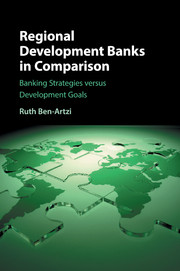Book contents
- Frontmatter
- Dedication
- Contents
- List of Figures
- List of Tables
- Preface
- Acknowledgments
- Introduction
- 1 International Financial Institutions, Development, and Regional Development Banks
- 2 Multilateral Governance: Theoretical and Empirical Underpinnings
- 3 Origins, Politics, and Structure of Regional Development Banks
- 4 RDB Loans and Developing Countries
- 5 Banks or Development Agencies?
- 6 Political and Economic Constraints, Principals and Agents, and Prospects for Development
- Conclusion: Future Outlook
- Appendix 1 Life Expectancy and HDI Rank
- Appendix 2 RDB Shareholders
- Appendix 3 AsDB Professional Staff
- Bibliography
- Index
Introduction
Published online by Cambridge University Press: 05 September 2016
- Frontmatter
- Dedication
- Contents
- List of Figures
- List of Tables
- Preface
- Acknowledgments
- Introduction
- 1 International Financial Institutions, Development, and Regional Development Banks
- 2 Multilateral Governance: Theoretical and Empirical Underpinnings
- 3 Origins, Politics, and Structure of Regional Development Banks
- 4 RDB Loans and Developing Countries
- 5 Banks or Development Agencies?
- 6 Political and Economic Constraints, Principals and Agents, and Prospects for Development
- Conclusion: Future Outlook
- Appendix 1 Life Expectancy and HDI Rank
- Appendix 2 RDB Shareholders
- Appendix 3 AsDB Professional Staff
- Bibliography
- Index
Summary
In his renowned novel Great Expectations, Charles Dickens explores class differences and struggles in nineteenth-century England through the story of a young boy named Pip. Living in a poor fishing town, Pip one day receives a huge sum of money from an anonymous source. The money is kept in a trust, intended to support Pip's transformation into a gentleman. Accepting the generous offer and the conditions that come along with it, Pip moves to London. He quickly becomes well-versed in the ways of the aristocracy, and more educated and sophisticated than he would ever have otherwise been. One day, the generous donor appears. To Pip's surprise, it is not the wealthy old lady whose niece he used to play with (whom he always suspected was responsible for his fortune), but a convicted runaway criminal whom he helped to hide when he was very young. This revelation poses some serious moral dilemmas: Is there an importance to the nature of the source of the money that meant to benefit Pip? Did it really benefit him, though it uprooted him from his home under the assumption that a privileged life among the nobility is superior? What power does the source of his finances have over his life, and what kind of demands can his benefactor make of him? Finally, given these circumstances and dilemmas, would Pip have been better off not accepting the offer?
The moral questions that are raised by Dickens’ novel on an individual level with respect to Pip, his personal destiny, and the choices he is given may also capture the complex relationship between donor and borrowing states within the arenas of international financial institutions and their policies. Ultimately, the concerns preoccupying the critics and supporters of these institutions are very similar to those presented by Dickens: In what way can or should donors impose their policies on those receiving aid? Are these institutions doing more harm than good? Would developing countries be better off integrating into the world economy at their own pace, with no outside influence? And, finally, would it be realistic to expect donor countries to provide aid but forgo imposing conditions on the developing countries receiving the aid?
- Type
- Chapter
- Information
- Regional Development Banks in ComparisonBanking Strategies versus Development Goals, pp. 1 - 6Publisher: Cambridge University PressPrint publication year: 2016



